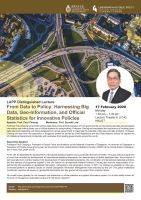Professor Paul Cheung will provide cutting-edge ideas and practical examples on how governments are harnessing big data and geospatial information and making better use of official statistics for policymaking. Professor Cheung will emphasise the importance of breaking down data silos and integrating and fusing datasets from across government to maximise the potential of big data and data analytics. Professor Cheung will draw from his experience in Singapore (where he served as Chief Statistician) and the United Nations (where he headed the UN Statistical Department) to illustrate with examples from leading governments around the world.
About the Speaker

Professor Paul CHEUNG
Professor Paul Cheung is Professor of Social Policy and Analytics at the National University of Singapore. He returned to Singapore in December 2012 after serving for 9 years as the Director of the United Nations Statistics Division (UNSD) at the United Nations Headquarters in New York (2004-2012).
At the UN, he facilitated the development of the global statistical system and coordinated the work of UNSD. He supervised a program of work that included the development of international statistical standards, the dissemination of global statistical data, the provision of technical advice to member states in the development of national statistical systems, the coordination of international statistical activities, and the delivery of program support to the UN System on all statistical matters. He also had the responsibility of implementing UN mandates on geospatial information, cartography, and geographic names. In 2011, his initiative to establish an inter-governmental platform to address issues on Global Geospatial Information Management was endorsed by the UN. This global multilateral mechanism explores all issues on geospatial information and has gained strong support from member states.
Prior to his appointment at the United Nations, Professor Cheung served as Chief Statistician of the Government of Singapore (1991-2004) and Director of the Population Planning Unit (1987-1994). He has received many national and professional awards for his work around the world, including the Public Administration Gold Medal by the Singapore government, the Royal Order of Sahametrei (Grand Officer) by the Cambodian government, and the Doctor Honoris Causa by the National University of Mongolia. He is well known globally for his research and leadership in official statistics and global information system. He is also widely known for his work on Singapore’s population policy and manpower research.
Related Information

This distinguished lecture free and open to all.
